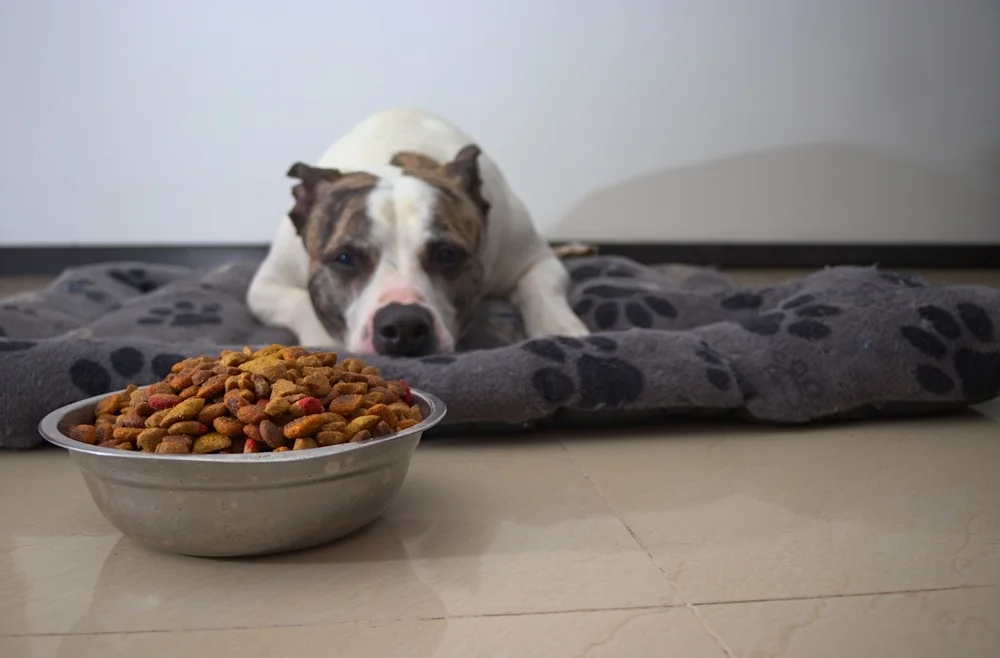PET BEHAVIOR
Why Is My Dog Not Eating? Reasons and What To Do
Your pup might not be eating for various reasons, including dental issues, an upset stomach, or just pickiness.1 While it’s natural to feel concerned, understanding these possible causes can help you figure out a plan.
Below, we’ll explore common reasons why your dog has no appetite, signs to watch out for, how to respond, and potential treatment options. If you’re a MetLife Pet policy holder, you can reach out to us for advice via telehealth chat.2
Always On Call — 24/7 Vet Telehealth Chat2
Common Reasons a Dog Won't Eat Their Food
Reasons your dog might stop eating are often related to health conditions, the food itself, or behavioral issues.
Health issues
Health problems are some of the most common reasons why dogs lose their appetite. To find out if your dog has an issue like this and how serious it might be, it’s a good idea to speak to your vet.
Some possible health-related causes include:1
- Loose teeth or other minor dental problems
- Dental disease, like periodontal disease
- Gastrointestinal (GI) issues, like an upset stomach or irritable bowel syndrome
- Infection and fever
- Liver disease
- Kidney failure
- Side effects from certain medications, like antibiotics
- Pancreatitis
- Vomiting
Food issues
Your dog’s appetite loss could be caused by the dog food itself. Many dogs can be sensitive to the smell or taste of their food, especially if it’s stale or spoiled. Store your dog’s food according to the instructions on the packaging. Throw away anything that smells off or is past its expiration date.1
Some dogs can be picky eaters, and it can take time to find food they like. If you’re switching to a new food, remember to do so gradually. Changing foods abruptly can lead to an upset stomach and further reduce their appetite.1
If you have concerns about your dog’s eating habits, speak with your vet.
Behavioral issues
Behavioral factors can also affect your dog’s appetite. Some common issues include:
- Anxiety: Changes in routine, new environments, or a bad experience with another dog can all lead to a loss of appetite. To help, keep to a routine and create a calm, quiet space for meals. When traveling or adjusting to a new space, bring familiar items — like their bed or toys — for comfort.3
- Learned behavior: If your dog skips meals hoping for treats or table scraps, they may have learned to wait for something better. Avoid giving treats close to meals. Stick to regular feeding times and check to make sure you’re not giving too many treats.1
- Routine changes: A disruption to mealtimes or the introduction of new pets or people can make your dog anxious, possibly leading to disinterest in food. Try to keep feeding schedules consistent and introduce new pets gradually. If major changes occur, offer your dog a quiet, safe space to reduce stress.3
To help, look for a local pet trainer with experience with this issue. Some vets may also prescribe anxiety medication to help dogs remain calmer, which can help bring their appetite back.
Questions To Ask if Your Dog Won’t Eat
If your dog isn’t eating, it’s important to closely monitor them and consult with a vet or emergency clinic. To help your vet figure out how to help, ask yourself the following questions:
- Does your dog have any other symptoms, like vomiting or diarrhea?
- Is your dog drinking water?
- Will your dog eat wet food or treats?
- Have you recently changed their dog food?
If your dog is lethargic, vomiting, or has diarrhea, seek veterinary care within 8 – 12 hours. These could be signs of a more serious medical condition. Other other red flags include excessive drooling, difficulty breathing, and increased drinking and urination.1
At-Home Treatment for Loss of Appetite in Dogs
If your dog seems healthy otherwise, boosting their appetite can be fairly simple. Your vet may recommend a few at-home steps to help, such as:4
- Adding canned food to their diet
- Warming up the canned food to make it more appealing
- Adding warm water to dry food to soften it
- Enhancing the kibble flavor with low-sodium chicken, vegetable, or beef broth
- Preparing homemade dog food approved by a veterinary nutritionist
If your dog’s appetite loss is a recurring issue and no underlying medical conditions are found, making an appointment with your veterinarian may be the best course of action.
When To Call Your Vet
If your dog’s appetite doesn’t improve or you notice other concerning symptoms — like vomiting, diarrhea, or lethargy — it’s time to contact your veterinarian. Your vet can evaluate your dog’s overall health, checking for signs of dehydration, infection, or underlying medical conditions — like kidney disease or diabetes.4
They might also run blood tests, take X-rays, or perform an ultrasound to get a clearer idea of what’s going on.4
Treatment will depend on the cause of your dog’s lack of appetite. It might involve medication, special diets, or more intensive care — like intravenous (IV) fluids or even tube feeding.4
How pet insurance can help if your dog stops eating
Since these tests and treatments can add up, having pet insurance can help you cover the cost of your dog’s care. With the right dog insurance policy, you can save on vet visits, diagnostic tests, and treatments for more serious medical conditions.
This way, you can focus on getting your dog the help they need without worrying as much about the financial burden.
Help Support Your Dog’s Health and Appetite
There are many reasons why your dog might stop eating, from food preferences and behavioral changes to underlying health issues. While some causes are minor, like switching food too quickly, others may signal a more serious problem. In most cases, speaking with your vet is the best way to discover the cause and find the right treatment.
Vet visits and treatments can be costly, but pet insurance can help you manage those expenses. A MetLife Pet Insurance policy can help you support your dog.
Dr. Hunter Finn has been paid by MetLife to discuss the importance of choosing pet insurance. He is an integrative veterinary expert first, and social media star second. America’s favorite veterinarian owns Pet Method in McKinney, Texas, where he cares for pets while prioritizing their emotional well-being. When he’s not at his clinic, he’s starring in viral videos on TikTok (2 million followers) and Instagram (500K followers) — where he’s been known to snuggle puppies and conquer the latest dance trends.
Help Your Pet Feel Better
(855) 270-7387



